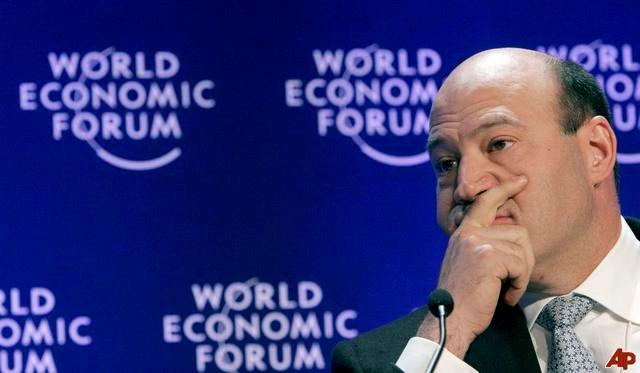
The reports of comments in Davos, Switzerland's World Economic Forum by Gary Cohn are so impressive that they made the first page of the Financial Times US edition. His position is obviously self-interested: nothing else should be expected from the Honorable firm. He and his peers recently increased their salary from $600,000 to $2,000,000!!!
What is worrying is not that he wants to avoid banking regulation now that Goldman Sachs is a bank holding company. That is perfectly natural, and shared at various degrees by several bankers. It happened at the Bank for International Settlement to dilute the constraints of the Basel III regulations, in Washington to avoid some of the rules of the Dodd Frank Act of 2010 and in Brussels to avoid European regulations and stress tests.
What Gary Cohn is warning about is the fact that "the unregulated sector will grow at an exponential rate". That includes two misgivings. The first one is that banking has a specific regulation because it is carrying on its balance sheets the savings and financing of the consumers and the economy. It has that privilege, and, let's face it, it is for some of the largest institutions, an oligopolistic structure that threatens the world equilibrium in a systemic way if it is misused. It is crucial that the trust that they enjoy en the huge franchise that is their goes in parallel with a set of regulations that no longer makes taxpayers the hostage of the kind of abuses we experienced over the past the years.
Where Gary Cohn is right, is in the need for a true regulation of what is now called "shadow banking". I would have perfectly understood if, instead of pleading for a watering down of the new regulations, he would have suggested a balanced regulatory structure that would also put some constraints on the non-banking financial institutions. It is in the balance between the two "universes" of finance.
However, it remains essential that banks no longer have the possibility or the right to use a "call" on taxpayers' money because their structure makes their bankruptcy unbearable. The "less-regulated" part of the financial world should be structured in such a way that some of its players can explode without requiring taxpayers' money.
When Gary Cohen states that "in the next cycle, as the regulatory pendulum swings, we are going to have taxpayers' money bail out unregulated businesses" his presentation is self-serving. It assumes that there is no regulation in the shadow banking world. That cannot and should not be the case.
Drawing conclusions for Gary Cohn's reasoning, I would recommend that banks work closely with the agencies who, today, draft the detailed rules to make sure that the "shadow banking world" be sufficiently regulated so that they never create a systemic risk.
That would be the responsible attitude. It might, however, be embarrassing for those institutions, like Goldman Sachs, who intend to play in both leagues.